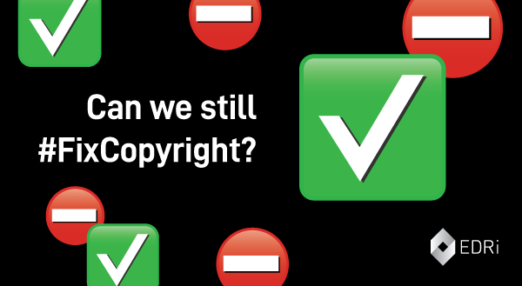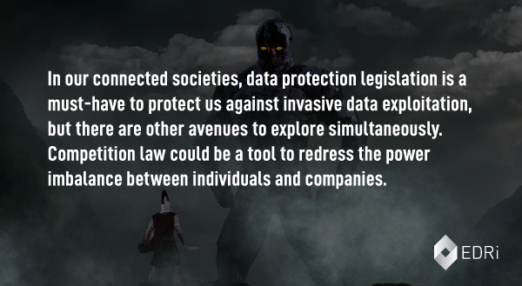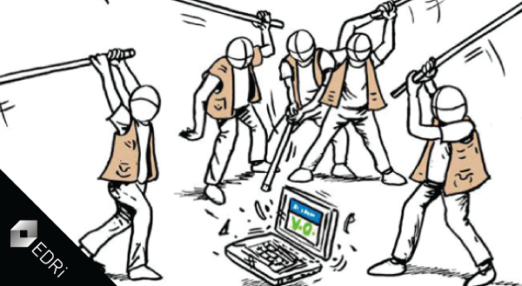Freedom of expression online
Filter resources
-

EDRi calls for fundamental rights-based responses to COVID-19
Some of the actions taken by governments and businesses under exceptional Coronavirus circumstances today, can have significant repercussions on freedom of expression, privacy and other human rights both today and tomorrow.
Read more
-

Terrorist Content Online Regulation: Time to get things right
Closed-door negotiations (“trilogues”) on the Regulation to prevent the dissemination of terrorist content continue in Brussels. After our open letter from December things have moved on fairly slowly at first, but, recently, new texts are quickly being discussed in order to try to reach an agreement soon. Nonetheless, according to MEP Patrick Breyer, many key issues remain open for discussion.
Read more
-

Who should decide what we see online?
Online platforms rank and moderate content without letting us know how and why they do it. There is a pressing need for transparency of the practices and policies of these online platforms.
Read more
-

Can we rely on machines making decisions for us on illegal content?
While automation is necessary for handling a vast amount of content shared by users, it makes mistakes that can be far-reaching for your rights and the well-being of society. Most of us like to discuss our ideas and opinions on silly and serious issues, share happy and sad moments, and play together on the internet. […]
Read more
-

Copyright stakeholder dialogues: Compromise, frustration, dead end?
The second phase of the stakeholder dialogues on Article 17 of the Copyright Directive finished in December 2019. The two meetings of the third phase, focusing on the provisions of Article 17, were held on 16 January and 10 February 2020.
Read more
-

The impact of competition law on your digital rights
This is the first article in a series dealing with competition law and Big Tech. The aim of the series is to look at what competition law has achieved when it comes to protecting our digital rights, where it has failed to deliver on its promises, and how to remedy this. This series will first […]
Read more
-

ECtHR: Obligation on companies to identify all phone users is legal
On 30 January 2020, the European Court of Human Rights (ECtHR) issued its judgment on the Breyer VS Germany case.
Read more
-

Bits of Freedom celebrates its 20th anniversary
EDRi member Bits of Freedom celebrates its 20 year anniversary. Bits of Freedom believes an open and just society is only possible when people can participate in public life without fear of repercussions. For this, every person needs to be free to share information and their private life needs to be respected. The right to […]
Read more
-

Online content moderation: Where does the Commission stand?
The informal discussions (trilogues) between the European Parliament, the Council of the European Union and the European Commission are progressing on the Terrorist Content Regulation (TCO, aka “TERREG”). While users’ safeguards and rights-protective measures remain the Parliament’s red lines, the Commission presses the co-legislators to adopt what was a pre-elections public relations exercise, rather than […]
Read more
-

Spain: New law threatens internet freedoms
On 5 November 2019, the Royal Decree-Law 14/2019 that had been adopted on 31 October was published in the Spanish Official State Gazette (BOE). This was just five days before the general elections that would take place on 10 November, under an undefined “exceptionality and urgency”, and justified by the “challenges posed by new technologies […]
Read more
-

Letter to Member States calls for safeguards in Terrorist Content Regulation
On 16 December 2019, EDRi and Access Now sent a letter to EU Member States urging them ensure key safeguards on the proposed Regulation regarding the removal orders, the cross border mechanism and crucial exceptions for education, journalistic and research materials in the ongoing trilogue discussions. This letter is another step in the work that […]
Read more
-

Shedding light on the Facebook content moderation centre in Athens
Following months of efforts, in early September 2019, EDRi observer Homo Digitalis managed to shed light on a case that concerns each and every Facebook user: a content moderation centre in Athens, Greece, tasked to moderate Facebook ads. As many other content moderation policies run by virtually unaccounatable private companies, this can pose threats to […]
Read more
